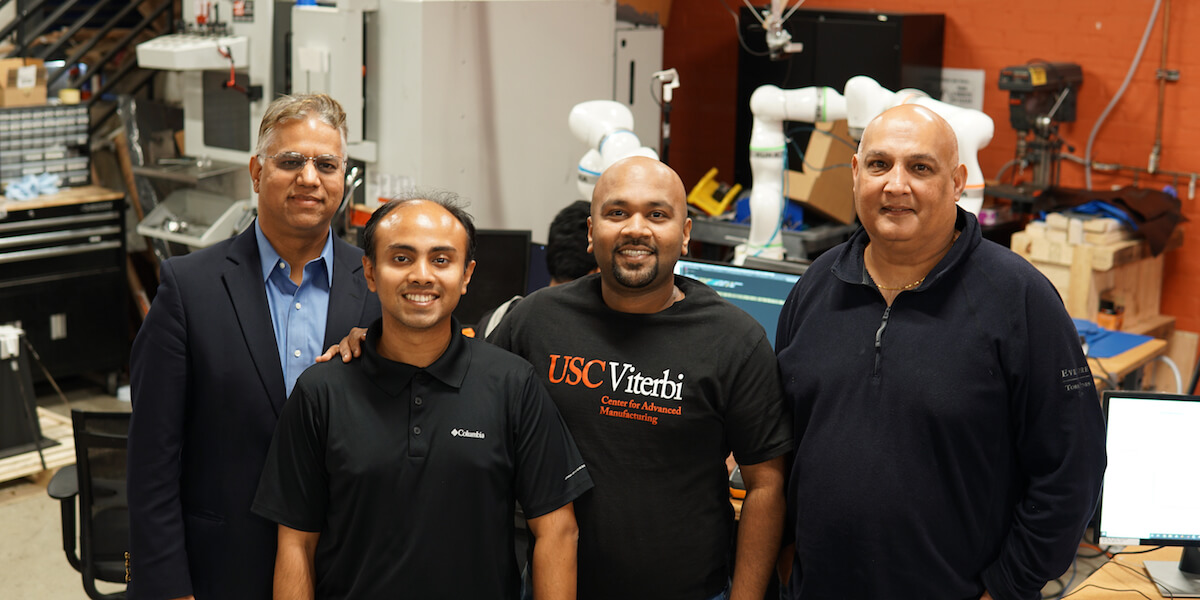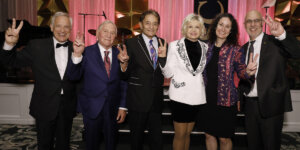
(Left to right) GrayMatter Robotics Inc. co-founders Satyandra K. Gupta, Ariyan Kabir, Brual Shah and Sangam Pant (Photo/Courtesy of Brual Shah)
Companies in myriad industries, ranging from airplane manufacturers to watchmakers to composite parts producers, must hire expensive workers to grind, deburr, sand and polish their products in the final stages of the manufacturing process.
However, there exists a dearth of such high-skilled workers to perform these dirty, dangerous jobs. The result: occasional manufacturing bottlenecks.
Members of the startup team, GrayMatter Robotics Inc., believe they have found a solution to this intractable problem.
The USC Viterbi-dominated team – including former USC Viterbi student Ariyan Kabir, Ph.D. ME ’19; Brual Shah, an AME research associate; S.K. Gupta, director of the Center for Advanced Manufacturing and Smith International Professor in Mechanical Engineering; and Sangam Pant, a former corporate executive and co-founder of Evercore Ventures — hopes to leverage AI to create smart and rapidly deployable robotic assistants to automate high-mix manufacturing tasks. GrayMatter’s robots could perform tasks that require frequent adaptation, the type of jobs manufacturers often struggle to fill.
On Friday, May 1, GrayMatter won the $50,000 grand prize at the 10th annual Maseeh Entrepreneurship Prize Competition. The startup also landed $20,000 in free legal services and patent application services. Because of Covid-19, USC Viterbi’s premier business model competition took place over Zoom for the first time ever.
“We are researchers and scientists who know technology well, but MEPC taught us how to build our business around customers’ needs,” Shah said. “We learned so much.”
Shah added that GrayMatter plans to put its MEPC winnings toward product development. The Los Angeles-based company officially launched in January and hopes to have its first product on the market by the end of the summer.
Fifteen teams were accepted in this year’s MEPC cohort, which kicked-off in November. They each received $500 from USC Viterbi’s Office of Technology Innovation and Entrepreneurship for customer discovery research.
The field was whittled down to five finalists on March 9. Teams competed for $50,000 in cash and more than $50,000 in free legal and business services offered by DLA Piper, Novus GC and Morrison Foerster.
USC Viterbi Dean Yannis C. Yortsos said MEPC has made an indelible impression.
“Spanning a decade of unparalleled success, MEPC is constantly inspiring the spawning of new initiatives: from the USC Viterbi Startup Garage to various new competitions to creating a fertile ground for our NSF I-Corps efforts to partnerships with the Grand Challenges Scholars Program of the NAE, to nurturing new mindsets in our students,” he said.
Alice Liu, the MEPC director, added that USC Viterbi and other students benefited greatly by participating in MEPC.
“They’ve gotten a taste of the entrepreneurial mindset, which equips our engineers to be successful in the innovation economy,” she said. “The skills they develop include everything from initiative and grit; flexibility and adaptability; good communication; creativity, and the ability to think up ideas and solutions for any situation.”
The 2019-20 MEPC winners include:
2nd Place: Ximera Therapeutics is developing novel CAR-T therapies that can secrete protein drugs to help improve the antitumor efficacy in solid tumors.
3rd Place: Duet is a resource and need aggregator for the world’s toughest challenges and the people and organizations solving them. The platform works on a novel model of philanthropy: donors buy a specific requested item and beneficiaries pick it up. Duet is currently oriented towards aiding those affected by forced migration because of war, economic stress and other conflict.
4th Place: MedMixer has developed a new medical device that simplifies the steps of very complicated drug administrations. The device combines the separation, mixing and delivery aspects for drugs with components that must be kept separate until time of delivery.
Atomus has built a USB device that plugs into any 3-D printer and counts the number of times a 3-D design file is printed. That allows corporations that own the 3-D design files to license their design files and receive payment when their products are 3-D printed by others.
Over five months, these USC Viterbi student-led teams attended seven workshops, including customer discovery, intellectual property, financials and storytelling, to sharpen their entrepreneurial skills. The National Science Foundation Innovation Corps (“I-Corps”) program, the nationally recognized lean startup program focused on technology commercialization, provided the curriculum.
The sessions were led by Liu, the MEPC director; Gianluca Lazzi, the Fred H. Cole Professor of Engineering; Provost Professor of Ophthalmology, Electrical Engineering, Clinical Entrepreneurship and Biomedical Engineering; and Pai-Ling Yin of the Lloyd Greif Center for Entrepreneurial Studies at the USC Marshall School of Business.
“This year, the teams were absolutely fantastic!” Lazzi said. “Even more impressive, however, was the students’ display of maturity in the process of pivoting from the traditional pitch to the new virtual setting – a challenge for even the most experienced entrepreneurs. All MEPC teams produced phenomenal video presentations in record time and handled the Q&A sessions superbly. In my eyes, they are all winners.”
MEPC, founded in 2010 with a $1 million endowment from entrepreneur Fariborz Maseeh, has become one of the university’s premier business model competitions for USC Viterbi students, faculty and other would-be business builders.
MEPC has spawned several promising companies over the past decade.
The 2019 MEPC winner, AIRBOND, now called Apogee Composites, has designed a more efficient and cheaper way to produce carbon fiber composite materials for the aviation and other industries. That year’s runner-up, Marlink, an all-women undergraduate team developing an underwater exploration device that allows information to be transmitted and received between AUVs and scientists, recently represented the United States in the Global Grand Challenges Summit finals in London. Marlink, was one of the first, if not the first, all-women undergraduate teams to compete in MEPC.
Thermal View Monitoring, the 2017 winner, has developed an image guidance system that provides a real-time, 3-D temperature map during thermal ablation therapy. Unlike with MRIs and CTs, physicians could take quality images right in the operating room, saving significant time and money. AesculaTech, the 2016 runner up, develops and manufactures a platform of temperature-responsive smart materials for use in medical devices, including the treatment of dry eye. After MEPC, AesculaTech received an invitation to Y Combinator, the famed Bay Area business incubator.
Second Spectrum, the 2013 victor, analyzes big data for insights into sport performance, such as what constitutes good defense and offense in basketball. Currently, all NBA teams receive Second Spectrum optical tracking data, which powers next-generation analytics.
“MEPC has been the cornerstone and the foundation of innovation and entrepreneurship at USC Viterbi,” Dean Yortsos said. “Through the 10 years of its existence, it has transformed the Viterbi technology innovation and entrepreneurship landscape into a vibrant ecosystem where student and faculty ideas find a true runway for take-off.”
Published on May 7th, 2020
Last updated on September 15th, 2021









